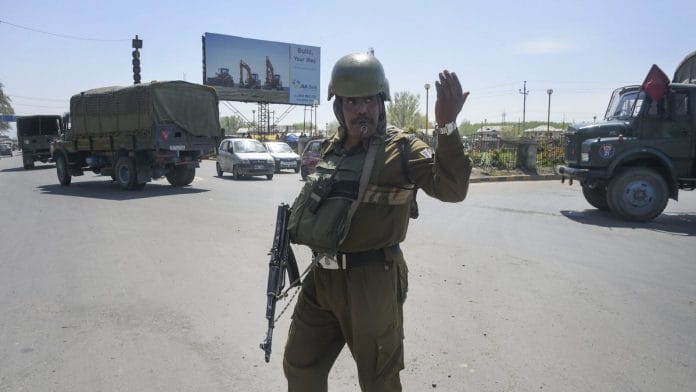Srinagar: The plan to ban civilian movement on the Jammu-Srinagar highway on Wednesdays and Sundays was a solely bureaucratic initiative that had no backing from the Army, the paramilitary forces or the Jammu & Kashmir Police, ThePrint has learnt.
Multiple officials in the central, state and local police administration said the security forces had made it clear to the state administration that two days would not be enough for security convoys, and they would continue to use the highway on other days as well.
The controversial ban, which has provoked comparisons between Kashmir and Palestine as well as apartheid-era South Africa, kicked in Sunday, and will be in force every Sunday and Wednesday until 31 May, a week after the Lok Sabha election results are announced.
Triggered by the 14 February Pulwama terror attack on a CRPF convoy that killed 40 personnel, the ban was imposed by the Jammu & Kashmir administration, currently headed by the governor, through an order issued on the evening of 3 April.
The officials said the idea to impose restrictions on civilian traffic on National Highway-44 was taken up at a meeting in Jammu, chaired by Governor Satyapal Malik, in the week leading up to the order.
Official sources told ThePrint that though the decision to bar civilian traffic on two days every week was taken at the governor-chaired meeting, it was a senior bureaucrat in the state who had first pitched the idea.
Also read: Kashmiris sense echoes of Palestine in highway ban, alienation with Delhi spikes
‘Not enough’
The armed forces, the sources said, made it clear at the meeting that reserving two days for their convoys was not enough, saying they would be moved keeping in mind their requirement.
“The paramilitary and police representatives, too, expressed their reservations and a consensus about the matter wasn’t reached completely,” a source privy to the deliberations told ThePrint.
“As a matter of fact, the Indian Army moved their convoys the day after the meeting and has been doing so despite the restrictions,” the source added.
“Keeping aside the vulnerability factor that comes with moving on the highway alone, it is mathematically difficult to move around entire convoys on two specific days,” the source said. “With elections around the corner, the task becomes even more difficult.”
Jammu and Kashmir votes in the Lok Sabha election through five phases beginning 11 April. A central government official told ThePrint that, at the moment, there were nearly 35,000 paramilitary troopers in the state for election duties alone.
“The first phase of the Lok Sabha elections in Kashmir will take place on 11 April, which is a Thursday, leaving only one day, Wednesday, to move paramilitary forces across the state,” the official said.
“The next phase will be held on 18 April (Thursday), which would once again leave the forces one day to move. It is likely the forces will move on other days of the week,” the official added.
A senior state government official, requesting anonymity, confirmed that security officers at the meeting had said that two days may not be enough. However, the official added, they “did not oppose the suggestion”.
“Yes, they (security forces) expressed their opinion in the said meeting,” the official said. “They (security forces) said two days were not enough for them to move their convoys and that is the reason the government order says that changes could be made in the future,” the official added.
According to the government order announcing the ban, “…the said regulation of vehicular movement on the National Highway would remain in force w.e.f. 03.04.19 to 31.05.19 and based on the experience during this period, necessary modification, whenever required, would be made”.
The official said that certain modifications were being made “to make the restrictions more effective and friendly to people”.
“Due to the terror attack in Pulwama, restrictions on civilians movement were bound to happen but we are trying to ensure that the restriction causes minimal inconvenience,” the official said. “A decision will be made in the next two-three days.”
Also read: Former IAS officer Shah Faesal moves J&K High Court against highway ban
First true test
Approached for comment, government spokesperson Rohit Kansal said he was held up with a state administration meeting, which was held Tuesday in light of the three PILs that have challenged the ban in the J&K High Court: One by IAS-officer-turned-politician Shah Faesal and two others by local advocates.
The “highway ban”, as it has come to be known, will face its first true test Wednesday, the first working day when civilian traffic will not be allowed to ply on the national highway.
The first day of the ban, which came this Sunday, passed by and large without any untoward incident, marked solely by protests, including those carried out by the local political players Peoples Democratic Party (PDP) and National Conference (NC).
The ban has been widely criticised in the Valley, with Faesal arguing in his PIL that it was a violation of Kashmiris’ fundamental rights. Locals, meanwhile, have taken to social media to criticise the decision, and the political parties are likely to draw on the resentment ahead of the election.






